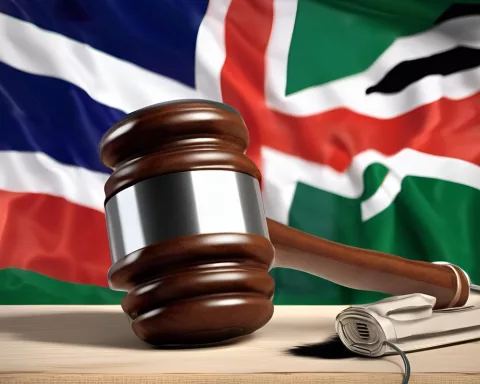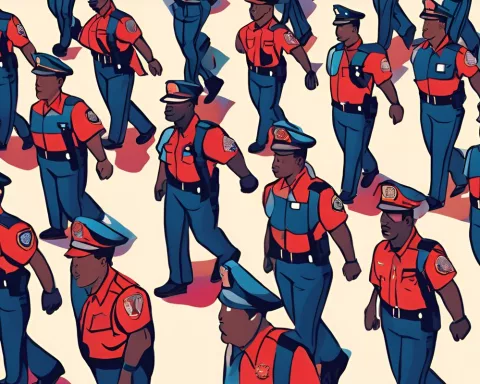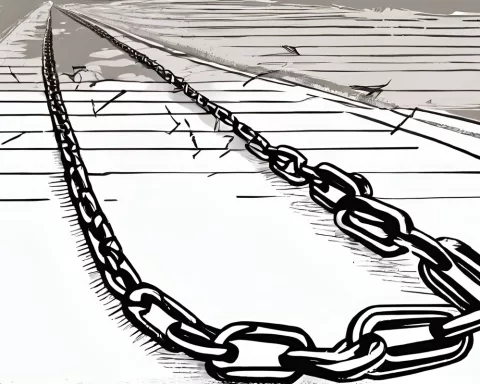The African National Congress (ANC) was surprised by an unexpected visit from the sheriff of the court who was there to seize the party’s assets due to an outstanding debt owed to eZulwini Investments. This highlights the importance of transparency in financial transactions and the intertwining of politics and law enforcement. The incident has larger implications for the ANC’s reputation, financial responsibilities of political organizations, and legal accountability in the face of power.
A Legal Predicament Rooted in a Financial Dispute
The African National Congress (ANC) faced an unexpected visit from the sheriff of the court, who was there to seize the party’s assets. This was due to an outstanding debt owed to eZulwini Investments, which the ANC disputed. This incident highlights the intertwining of politics and law enforcement and the importance of honoring agreements and upholding transparency in financial transactions.
On a regular Tuesday morning, the African National Congress (ANC) was in full swing at its headquarters, Luthuli House. To their surprise, they had an unexpected visitor – the sheriff of the court, who was on a mission to seize the party’s assets. This unexpected course of events generated a buzz of activity, with rumors of blocked access to the building adding fuel to the fire. Social media was soon abuzz with reports, painting a telling portrait of a ruling party enmeshed in legal woes.
A Legal Predicament Rooted in a Financial Dispute
This situation did not occur in a vacuum. It was the consequence of a court order to confiscate the ANC’s assets, with the objective of recovering an outstanding debt of R102 million owed to eZulwini Investments. The ANC had unsuccessfully tried to overturn a previous Gauteng High Court ruling at the Supreme Court, leaving it in this current predicament.
The origin of this financial disagreement can be traced back to the 2019 general elections. According to eZulwini Investments, there was a verbal agreement that the company would manufacture and install 30,000 PVC banners as part of the ANC’s final campaign strategy before the elections. The investment firm charged the ANC R2900 for each banner and an additional R70 for its removal.
When it was time to pay for the services rendered, the ANC disputed the claim, arguing that there was no formal written contract. They claimed that the then treasurer-general, Paul Mashatile, had not finalized an agreement, thus relieving them from having to pay the specified charges. However, this argument was subsequently dismissed by the court.
The Consequences: A Seizure of Assets
In the wake of these events, tensions heightened culminating in the sheriff’s unexpected visit to the ANC headquarters. His inventory comprised a broad spectrum of assets, from office equipment like filing cabinets, conference room furniture, and chairs, to more significant items including computers and a Ford Ranger. These items, critical to the ANC’s daily operations, were on the verge of being carted away from the premises.
This incident underscores the intricate intermingling of politics and law enforcement, a dance that can often spiral into the realm of uncertainty. It serves as evidence of the potency of a nation’s legal framework, even in confrontation with a ruling party.
The Larger Implications
The consequences of this incident carry significant weight for the ANC and for South Africa as a nation. For the ANC, the implications go far beyond the financial loss. The event could potentially have a long-term impact on the party’s reputation, a stain on their public image that could shape future political trajectories.
On a national level, it raises questions about the relationship between political organizations, their financial responsibilities, and the repercussions of non-adherence to these obligations. It acts as a cautionary tale, illuminating the importance of honoring agreements and upholding transparency in financial transactions.
As the South African public observes this situation unfold, it serves as a stark reminder of the fallout that can occur when those in authority shirk their responsibilities. More importantly, it signifies the resilience of the law, affirming that even the most powerful entities are not exempt from facing the consequences of their actions.
As the dust settles at the Luthuli House and the seized assets are tallied, the narrative continues to evolve. This narrative is more than just a tale of a ruling party entangled in a court order, it’s a wider story of legal accountability and transparency in the face of power. It’s a story that, in its telling, will continue to shape the political and legal landscape of South Africa.
What led to the visit from the sheriff of the court to the ANC’s headquarters?
The visit was a result of an outstanding debt of R102 million owed by the ANC to eZulwini Investments, which the party disputed. The court had previously ruled in favor of eZulwini Investments, and the ANC’s attempts to overturn the ruling were unsuccessful, leading to the seizure of assets.
What was the origin of the financial disagreement between the ANC and eZulwini Investments?
The dispute arose from a verbal agreement between the two parties in which eZulwini Investments would manufacture and install 30,000 PVC banners for the ANC’s election campaign in 2019. eZulwini Investments charged the ANC R2900 for each banner and an additional R70 for removal, which the ANC disputed, arguing that there was no formal written contract.
What assets were seized during the visit from the sheriff of the court?
The seized assets ranged from office equipment like filing cabinets, conference room furniture, and chairs, to more significant items such as computers and a Ford Ranger. These items were critical to the ANC’s daily operations.
What are the implications of this incident for the ANC?
The incident could potentially have a long-term impact on the party’s reputation, a stain on their public image that could shape future political trajectories.
What are the national implications of this incident?
It raises questions about the relationship between political organizations, their financial responsibilities, and the repercussions of non-adherence to these obligations. It acts as a cautionary tale, illuminating the importance of honoring agreements and upholding transparency in financial transactions.
What is the larger story behind this incident?
The incident underscores the intricate intermingling of politics and law enforcement, a dance that can often spiral into the realm of uncertainty. It’s a wider story of legal accountability and transparency in the face of power that will continue to shape the political and legal landscape of South Africa.












